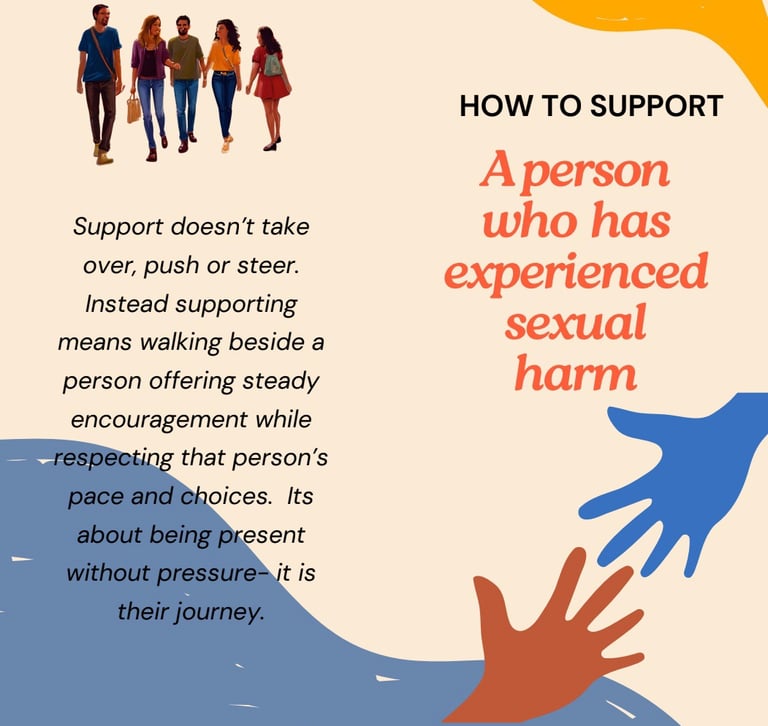How to Support a Person who has Experienced Sexual Harm
Maybe a person has disclosed their sexual harm to you? Either their own experience, a concern, or they just want to talk about the topic.
You can offer the best assistance by directing them to find the information and support they may need. It is important a professional helps them tell their story in a way that doesn’t retraumatise them.
What you can offer
Know your role
Your role is to affirm their experience and support them to find the resources they need. You’re not a therapist or investigator.
Empower
Present information, options and help find resources, but allow the person to make their own choices- even if that is not to act.
Be Led By Them
Trauma recovery and decision making take time. Respect their need for space. Progress doesn’t always move in a straight line or at a constant pace .
Respect confidentiality
Trust is vital, breaches of confidentiality can be devastating. Never share a person’s story without consent, unless there is a legal duty to report e.g. child abuse or risk of harm.
Trauma effects can be long lasting
Research the effects of trauma, so you have a little knowledge of what they may be experiencing.
Recognise distress
Stay calm and reassuring that this will pass.
Self Awareness and Self Care
Know your limits: check - are you emotionally and mentally ready to do this right now? It’s okay to step back if you aren’t. You can call safe to talk to clarify the next step for the person if you feel out of your depth.
If you feel helpless, just listen: It’s good to focus on listening before using spiritual statements e.g. The Lord will work it all out. This will avoid unintentionally minimising their experience with common one liners.
Be aware of your own triggers: If someone’s story touches a raw part within you, be honest with yourself. Seek support and guidance if you need it. You will also be modelling to the person you’re supporting that it is okay to ask for help.
Avoid dual roles/Conflicts of interest: It’s hard to stay objective when we are personally close to a situation. But we have duty to act in best interest of the person we are supporting.

The Psychcentral.com website has some good information about trauma, and how to support people experiencing it. For example:
What is Trauma?
The following video is a great summary of trauma and its relating issues and how to support someone who has been traumatised.
Where Can I Find Information?
Safe to talk
A great site for information about sexual harm issues
ph: 0800 044 344 or txt 4334
Mental health foundation
Check out their resources page for information on what trauma looks like and other mental health issues.



Fostering a Fellowship that is child safe, supportive and nurturing for everyone.
If you think a child is in immediate danger, contact:
New Zealand - Call (111)
Australia - Call (000)


